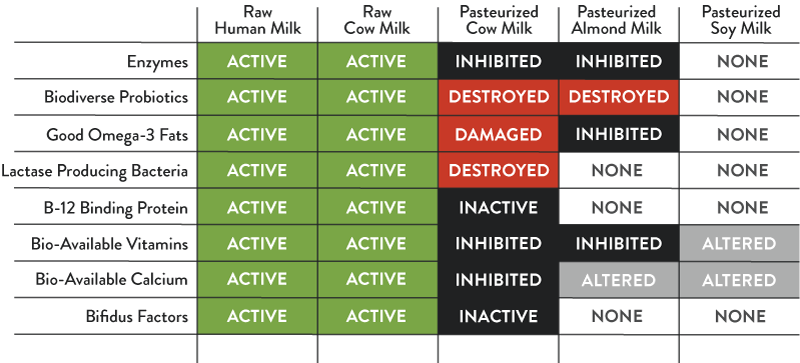
Enzymes – During the pasteurization process important key enzymes are killed that support a healthy gut and immune system.
Biodiverse Probiotics – Probiotics are microorganisms that support nutrient absorption and protect you from bad microorganisms. Pasteurization kills the beneficial bacteria.
Good Omega-3 Fats – When cows are given their natural diet, the milk they produce is high in omega-3 fats, creating a near perfect ratio of omega-3 to omega-6 fats. Our modern diet puts a lot of strain on our bodies, often leaving us with far more omega-6 than omega-3 fatty acids. Omega ratio imbalance can lead to inflammation that many doctors suspect to be at the root of the most troubling illnesses of our time.
Lactase Producing Bacteria – Lactase is found naturally in real milk and it’s purpose is to break down the milk sugar lactose. During pasteurization Lactase is destroyed causing our bodies to work harder to produce the means to break down lactose when we consume pasteurized milk. Some people’s bodies are unable to do this so they are labeled “lactose intolerant.” Most if not all “lactose intolerant” individuals have no problem drinking raw milk because the lactase naturally breaks down the lactose.
B-12 Binding Protein
Bio-Available Vitamins & Calcium – As opposed to pasteurized milk, the vitamins in raw milk are fully intact and bioavailable. Real milk from pastured cows is significantly higher in the extremely beneficial vitamin K2. This vitamin was studied by Dr. Weston A. Price, who understood its powerful health-boosting properties and called it Activator X.
During pasteurization, more than 50% of vitamin C is lost. The primary cofactors, enzymes and proteins that assist in the absorption of folate, B12, B6, and iron are also destroyed with pasteurization.
Bifidus Factor – Bifidus factor is a carbohydrate found in human milk and raw cow milk which stimulates the growth of a beneficial probiotic Lactobacillus bifidus, which lowers the pH of the intestinal contents and suppresses the growth of E. coli and other bad bacteria. It also prevents harmful bacteria from converting nitrates into nitrites, which are known to cause cancer.
